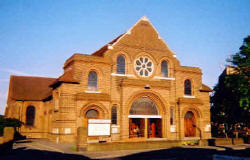|
The next minister at Pier Avenue was
Rev Samuel Morris, who moved to Clacton in 1932 from Liverpool. He was a
fine preacher, and the Church prospered during the first part of his
ministry.
In 1933, Rev Morris preached a
momentous sermon, during which he referred to the trend for allowing
secular entertainment at the Town Hall on Sundays – which he strongly
disapproved of. A Church member sent a copy of the sermon to London,
which was passed onto the ‘Evening Standard’, who published the headline:
‘MINISTER ATTACKS TOWN HALL SUNDAY ENTERTAINMENT DESIGNED TO APPEAL ONLY
TO THE
BASE IGNOBLE AND DEPRAVED TASTES’.
A few weeks later, Mr Morris was
served with a writ suing him for slander, and the Evening Standard for
libel. This led to a trial which received national coverage and in 1935
Mr Morris was finally cleared of all charges. He received support from
all over the country and for a time became something of a celebrity.
In 1939, with the outbreak of the
Second World War, a time of great struggle began for the Church.
Clacton’s population was drastically reduced by mass evacuation and only a
few worshippers remained. Mr Morris supported himself for a time by
selling insurance but in 1943 he resigned from the pastorate and moved to
Turret Green Baptist Church, Ipswich.
He was succeeded by Rev Hugh
McCullough, widely known as one of the ‘Essex Five’ – a group of preachers
committed to evangelistic outreach in the county. During the early days
of his ministry, the Church began to revive as people returned to the
town. By 1948, the membership stood at 233, and the Sunday School
register had 340 names. Mr McCullough inaugurated a summer Bible
Convention in Clacton which continued until the 1990s. He was elected
President of the Essex Baptist Association in 1948.
The following year, Mr McCullough died
after a short illness. The Church resolved to approach Dr Wilkinson
Riddle, the former minister of Plymouth's George Street Baptist Church, to
consider him coming to Clacton during the summer in a largely preaching
capacity. He agreed, and the ‘temporary’ arrangement became permanent in
January 1950. During his pastorate in Clacton Dr Riddle was editor of the
‘Christian Herald’ newspaper.
back to top
In 1957, Dr Riddle was succeeded by Rev David Lewis, a
Welshman who served at Pier Avenue for six years. He is fondly remembered
by the older generation as a man of great sensitivity and kindness.
During his pastorate, the front interior of the Church was
much altered, with the removal of the old organ and choir stalls,
and the installation of an electric organ, baptismal changing rooms and
new choir seats.
The next minister, Rev David Mucklow,
came to Clacton as a young minister and served for five years (1964-1969)
at a time of great social change and upheaval. Derek is still a good
friend of the Church, and has served as guest speaker at our Church
Houseparty in Eastbourne in recent years. A highlight of his ministry was
a baptismal service broadcast on Anglia Television.
Rev Ralph Stephens came to Clacton in
1970, following Mr Mucklow’s move to Winchmore Hill. The Manse, which had
been in Wellesley Road, was sold. A link is maintained between the
Church and Ralph Stephens to this day, since his daughter Janet continues
in membership.
Following Mr Stephens' move to
Gloucestershire in 1977, there was a two-year
interregnum, during which time the Church was ably led by Mr
Kenneth Hoborough, who served as Moderator at least five times in the
Church’s history. He also gave outstanding service as Church Treasurer,
Secretary, Deacon and in many other capacities.
Rev Harry Whyte came to the Church in
1979, when a new manse was purchased for his use. He was succeeded in
1982, by Rev Leslie Wright, whose ministry was cut short by his sudden
death from a heart attack in 1990.
- Telephone the Church Office: 01255 474391 or
email us
|

![]()
![]()
